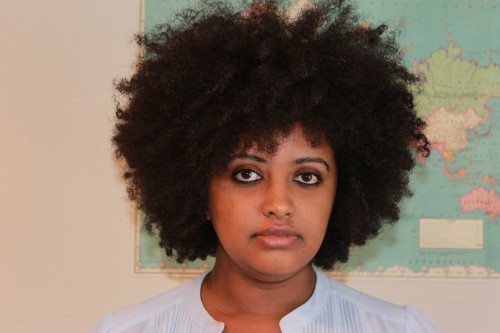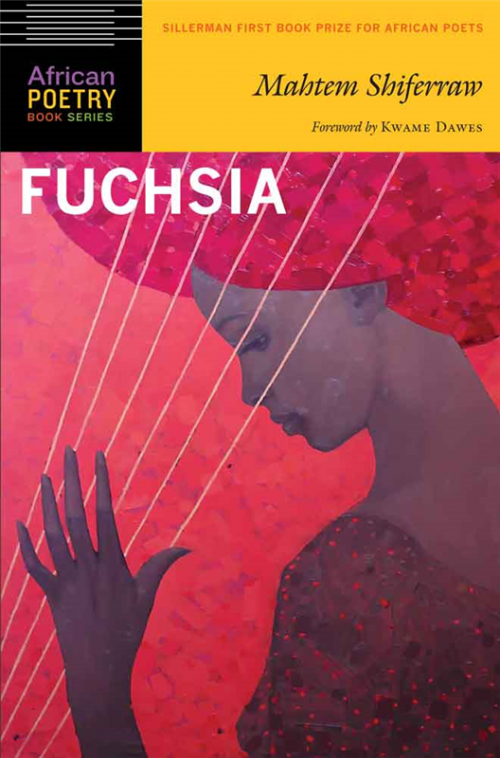It really is a thrill to feature three poems from Mahtem Shiferraw’s debut poetry collection, Fuchsia, here at NC. Longtime readers may remember Mahtem from our production masthead many moons ago, and now she rejoins us having received the Sillerman First Book Prize for African Poets. Fuchsia is a thrilling debut, and, as Yusef Komunyakaa praises, it “captures mysteries of the heart and mind alongside everyday rituals.” Enjoy this small slice of a beautiful book. — Benjamin Woodard
Talks about Race
I have dark skin, dark face, and darkened eyes –
the white resides only outside the pupil.
I don’t know how to think of this –
I wasn’t taught to notice one’s colors;
under the sun, everyone’s skin bounces streaks of light.
Which do I claim? It is difficult to explain
the difference between African & African American
the details escape me, thin paper folding the involucre of a burning fire.
I am “other”; it is such
an indistinguishable form, beyond the construct of the proper self.
Sometimes I am asked
if I am Indian, Middle Eastern, or Biracial;
I don’t know what to say to these people
who notice the shape of the eye before its depth
the sound of the tongue before its wisdom
the openness of a palm before its reach.
And what to those who call me, “African”?
Don’t they know I can count the years spent back home
wishing I knew I was “African”?
And how to cradle, and contain the disappointment that is
rekindled whenever someone does NOT know
my Ethiopia, my Eritrea.
I don’t know how to fit, adjust myself within new boundaries –
nomads like me, have no place as home, no way of belonging.
.
E is for Eden
It lasts a while. The bitter aftertaste of sorrow
and something sweet. Like honey waves soaked
in lemon juice, it creates hollow spaces between
moments of unabridged whiteness. Glance over
once and the skies have a different story to tell.
You were created with a purpose:
a land of all lands, neither heaven nor earth
suspended between the blue wings of oceans
and their unoccupied gaze.
Once there were creatures here, inhabiting
your luscious corners, and they prodded and swiveled
and flew to please you.
You were made in somebody’s image,
but you have forgotten.
What remains now is the aftermath –
even that stripped of all its glory.
The eyes of men are saddened by the sudden
shadows unveiling in women’s eyes. Your breath
was once dirt, ash, tangible and ugly. Your face
did not exist. The contours that shape your smile,
your hairline, the timid dimple on the left cheek, they
were all ash. Here is what was: only the thought of
being loved and rejected, being loved and birthed,
being loved and destroyed. Your breath does not have
the apple’s acrid taste; it smells of something wild and
unadorned, it says do not fear, it is I, it whispers at night
when you are cold and shivering and alone in this world.
This breath is not yours to take:
mend it and oceans will flow once again.
.
Synesthesia
White is a color,
black is art. Nod to those before you.
Brown is a sense of being, and dark hovers
only beneath the shadows of necks –
those who fear it most. Here is to fear.
Red are the tip of shoes of the woman
who waited in the bathroom patiently when I was
only three – to steal my mother’s ruby earrings. White
is the unsafe silence of bathroom walls, and their
morbidly cubic nature. White is water running under
my feet, the innocent screams of school children
at lunch hour.
Brown is the anomalous texture of curtains from my
childhood. Brown is also the parched wood
of a small coffee-grinder my mother used. Brown as in
the intimate angles of sharply cut ambasha my grandmother
made, flour and water, lemon skin and cinnamon shreds, the
dark heads of raisins, while on a cargo plane back to Ethiopia,
the tired eyes of war-victims and their slow recovery. Brown
is also the color of my skin, but I didn’t know it then.
Blue are the waters embedded in my grandmother’s eyes. Blue is
the whisper of the Nile, Abbay. Blue is the color of the brave. Blue
are the walls of empty neighbors houses and the insides of their
living room. Blue is skimmed milk tearing the sky.
White sometimes comes back at odd hours. White are stranger’s eyes
drenched in sadness. White is the uniform of doctors, the smell of
alcohol and something mad. White is absence. Purple comes back
as shoes, American shoes. Sky and blood under a quiet shadow. The
shadow of a young tree planted in memory of a murdered teacher in
high school. And the milky paste of over-ripe figs spurting prematurely,
spiking insides. Purple is warmth in mid-July, when rain hails on corrugated
tin roofs and the leaning green arms of lonely corn plants.
Yellow is crying; it’s a bell, a cathedral in Asmara? A school? Or the
shriek of a mass funeral. Yellow is dead. But listen to black. Listen to
black notes, black heart, listen. Black is art. Not of the artist, the art of
being. The painful art of memory. Here’s to remembering.
— Mahtem Shiferraw
Excerpted from Fuchsia by Mahtem Shiferraw by permission of the University of Nebraska Press. © 2016 by the Board of Regents of the University of Nebraska. Available wherever books are sold or from the Univ. of Nebraska Press 800.848.6224 and at nebraskapress.unl.edu
.
Mahtem Shiferraw is a poet and visual artist who grew up in Eritrea & Ethiopia. Her work has been published in The 2River View, Cactus Heart Press, Blood Lotus Literary Journal, Luna Luna Magazine, Mandala Literary Journal, Blackberry: A Magazine, Diverse Voices Quarterly, The Bitter Oleander Press, Callaloo Literary Journal and elsewhere. She won the Sillerman Prize for African Poets and her full-length poetry collection, Fuchsia, was published by the University of Nebraska Press. Her poetry chapbook, Behind Walls & Glass, is forthcoming from Finishing Line Press. She holds an MFA in Creative Writing from Vermont College.
.

